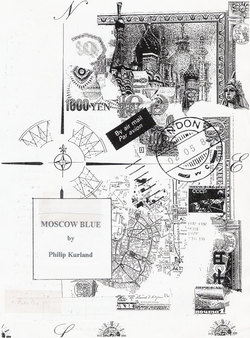Читать книгу Moscow Blue - Philip Kurland - Страница 3
Foreword
ОглавлениеMoscow Blue concerns that period in global history when the mighty Union of Soviet Socialist Republics had already disintegrated irretrievably.
The action of the story is set in and around the world of international trading and its complex dealings in all forms of commodities, generating rich pickings for some, frustration for most and disaster for others. This old and well established form of business takes place in an environment where most contracts are negotiated freely, some desperately bargained for, and others taken by force.
It is perhaps not surprising to discover that in the years leading up to Perestroika, when capitalism and its main goal, profit, were illegal, raw survival for many in the USSR often consisted of various forms of secretive trading in which all types of commodity became negotiable currency.
Buried beneath the great land mass of the largest country in the world, spanning 12 time zones, lies enormous wealth. Despite this, pipedreams were negotiated at length in dark corners of private and public places, and people were bought and sold at any time of day, with or without their approbation.
With Perestroika came the lowering of political and physical barriers over which the residents within could fully appreciate what was possible and attainable on the outside, and being only human, mechanisms were put in place to allow some of the country’s colossal assets to find their way into the pockets of the avaricious few who had the opportunity, expertise and ability to trade. The deprived, thinking Russian, without the right background and its associated connections, became embittered, frustrated and malcontent at seeing some of his less deserving countrymen being overindulgent, profligate and intemperate, spending as if there were no tomorrow.
A major contribution to this bubbling and potentially explosive cauldron was the coming and going of visiting overseas biznessmen - as the Russians called them - who merely by casual contact, were living proof of the material benefits of Western ways which were to be found just beyond the borders.
The divide had begun. The powerful few used any means available to them to ride rough shod over the timid majority. Potent criminal gangs became organised, some within governmental departments, others independently, but all with the same purpose - to make easy money and lots of it. The Russian public at large had found it increasingly difficult to separate the lawful KGB and the overtly criminal Mafia, when members of one organisation could step into the shoes of the other, causing confusion and frustration. Now there was the FSB.
By 1992, there were no survivors with any commercial experience from pre-revolution Russia, and middle management had become a rare commodity since the Stalin purges. Major decisions were made centrally where a limited number of party members with newly acquired experience had been gathered together. Outside Moscow, there were only a few sophisticated Titans of industry who were privy to the whole gamut of procedures which together enabled their industry to function.
Thus the Devil’s seeds were sewn among the Russian populace, and no-one could foretell what mutations would evolve and fructify.
